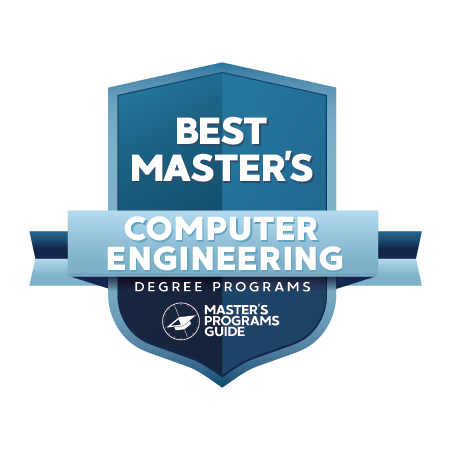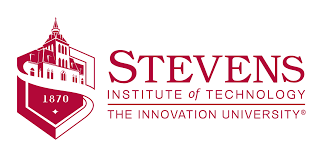Ready to find your ideal master's program?
www.mastersprogramsguide.com is an advertising-supported site. Featured or trusted partner programs and all school search, finder, or match results are for schools that compensate us. This compensation does not influence our school rankings, resource guides, or other editorially-independent information published on this site.
Whether you’re interested in becoming a programmer or a software developer or anything in between, a master’s in computer engineering is the first step you need to take to help you meet your goals.
Although it can be a challenging, demanding field, a career in computer engineering is a smart choice if you want to enjoy a high earning potential and access to competitive jobs.
Computer engineers have been in demand since the computer was first invented—and the demand isn’t expected to die down any time soon. It’s not the oldest form of engineering out there, but it’s often considered one of the most relevant and important for the future.
Can’t you work in this field with just a bachelor’s degree?
You can—but getting a master’s degree is a wiser choice.
A bachelor’s degree in computer engineering or even software engineering will prepare you for an entry-level position in the field. However, earning a graduate degree will allow you to become more competitive and potentially earn a higher salary. A master’s might also equip you with the leadership skills you need to earn a higher-level, management-style position.
Of course, many graduate programs in computer science are also rich in research opportunities. Because of this, pursuing a master’s is a smart choice if you think you might want to dive into a position in academia or potentially earn a doctoral degree one day, too.
Earning an MS computer engineering degree is a smart choice regardless of what your current background and experience might be. Most programs like these last for around one to three years, though some can be accelerated so you can finish up even faster than that. Some can even be completed online, allowing you to study in the comfort of your own home!
The very best programs in computer engineering will teach you the specifics about how a computer is constructed. You may be able to focus on a specific topic, like information technology, software engineering, or networking, allowing you to really hone in on your career goals and personal strengths.
In most cases, the top programs in computer engineering will also allow you to embark on original research opportunities and study abroad experiences with experienced, accomplished faculty members. You could even participate in cooperative learning or internship experiences. Many schools offer graduate students teaching assistantships or fellowships so that they can really learn by doing hands-on work and teaching—and get paid for their hard work in the process, too.
Once you graduate from one of these computer engineering master’s programs, you’ll be able to work in a variety of fields, including:
- telecommunications
- aerospace
- biomedicine
- government agency
This is a highly interdisciplinary field that is constantly evolving—and the best way you can keep up is to keep learning and evolving right along with it.
So without further ado, it’s time to dive into our list of the best master’s degrees in computer engineering. You’re sure to find the perfect program to help you meet your goals!
See Also: 10 Best Master’s in Industrial Engineering
What Are the Best Master’s Degrees in Computer Engineering?
We know that you have educational goals that you’re itching to pursue, but you may not know where to start. The editors of Master’s Programs Guide utilize a unique ranking methodology based on the following five aspects:
25% Overall Degree Affordability: Average cost of undergraduate and graduate tuition per school
25% Graduation Rate: Number of students who start at the university and actually finish there
20% Earnings Potential: Average mid-career salary of school alumni
20% Selectivity: The number of students who apply versus the number who actually get accepted
10% Online Graduate Offerings: The number of programs offered online in each department
At Master’s Programs Guide, we strive to do our best to guide you and your family toward a fruitful academic career. The pursuit of knowledge is a noble one, and we want to help you reach your goals.
See Also: 10 Best Computer Engineering Graduate Schools
#1. Georgia Institute of Technology-Main Campus
Master of Science in Computer Science
Located in the heart of Atlanta, GA, Georgia Institute of Technology, often referred to as Georgia Tech, has been known since its inception for its dedication to offering quality technical-based programs to its students. Founded in 1885, the school has highly ranked graduate schools including the College of Engineering and the Scheller College of Business.
This best Master of Science in Computer Science is a terminal degree program for students who are interested in jumping right into their work as computer science professionals. There are three different options for completing this degree, which are open to students both with and without formal computer science backgrounds.
You can choose from a coursework-only option, a project-based option, or a thesis option. All require 30 credit hours of study and will allow you to pursue a variety of electives and specialization options. In fact, students in this program have eleven different areas of specialization to choose from, including:
- computational perception and robotics
- computer graphics
- computing systems
- human-centered computing
Your courses will cover everything from machine learning to computer vision, graph algorithms to video game design. This diverse program MS program is an excellent choice to suit students of all backgrounds, ability levels, and career goals.
#2. University Of Illinois – Urbana-Champaign
Master of Computer Science MCS
Although the name might be a bit of a mouthful, it’s easy to see that the University of Illinois-Urbana Champaign has plenty to offer prospective students. A public university comprising 15 schools and colleges, this university was founded in 1867 and is located just a few hours from major cities such as St. Louis, Indianapolis, and Chicago.
With the School of Information Sciences, College of Engineering, and Department of Psychology being ranked among the best schools in the country, this university is also one with the highest level of research activity according to the Carnegie Classification of Institutions of Higher Education.
It’s also accessible to learners of all backgrounds, having been the first school in the country to provide disability access to each and every university service. The average student-to-faculty ratio here is just 20:1, meaning you’ll enjoy a highly personalized education when you enroll in the hands-on Master of Science in Computer Science.
This program is a non-thesis pathway that requires 32 credit hours of graduate coursework. Four courses must be chosen from a unique core area of computer science while an additional 12 must be undertaken at the advanced graduate level.
You can take courses on campus or online, but whichever you choose, it’s important to note that GRE scores are not required. This easy-to-apply-to program includes core courses such as:
- Database and Information Systems
- Bioinformatics and Computational Biology
- Artificial Intelligence
- Formal Methods, Programming Languages, Software Engineering
Although this top master’s program does not offer students research or teaching assistantships, it is an affordable degree with tuition rates starting at just $670 per credit hour.
#3. University of California, Los Angeles
Master of Science in Computer Science
The University of California-Los Angeles has one of the best campus locations in the world. It’s situated in the historic Westwood neighborhood of Los Angeles, just five miles from the Pacific Ocean. Here, you can study in one of the school’s many highly-ranked colleges and schools and spend your spare time with one of the more than 1000 student organizations!
The Samueli School of Engineering offers one of the nation’s best Master of Science in Computer Science degrees. The department is home to 38 faculty members (all of whom are highly accomplished in their respective disciplines) and 31 research labs and centers.
This top Master of Science degree offers potential concentrations such as:
- graphics and vision
- network systems
- information and data management
- computational systems biology
- artificial intelligence
You’ll be required to complete either a thesis or a capstone project that synthesizes all of the information you have learned into one final culminating experience.
Regardless of the concentration you select, you’ll likely take classes such as Principles and Practices of Computing, Variable Topics in Computer Science, and Operating Systems Principles.
#4. Carnegie Mellon University
M.S. in ECE – Electrical and Computer Engineering
Founded by philanthropist and industrialist Andrew Carnegie himself, Carnegie Mellon University is located in Pittsburgh, PA. As you might expect, this school has a reputation for ingenuity and innovation – a testament to its founding!
The school is known for its programs in science and technology. All students here have the opportunity to participate in research with many receiving grants or summer fellowships to finance their research in their respective areas of interest. It’s highly ranked by U.S. News & World Report, with accolades listing it as one of the top national universities as well as one of the best colleges for veterans.
Here, you’ll find an outstanding Master of Science in Electrical and Computer Engineering. You will gain a solid background in the fundamentals of computer engineering while also being able to specialize in a particular aspect of the field. You can choose from concentrations such as:
- computer security
- wireless systems
- integrated systems design
- computer security
- cyber-physical systems
In addition, you can choose to add on a dual degree to your plan of study. Many students tack on a Master of Science in Engineering and Technology Innovation Management, which requires just a few additional courses. There’s a study-abroad program you can participate in as a collaboration with King Mongkut’s Institute of Technology Ladkrabang in Thailand.
Other dual degree options include those in music and technology, energy, science, technology, and policy, and more. Many students also pursue affiliated programs in fields like information networking and security that are offered by the INI, the Information Networking Institute at Carnegie Mellon.
This top MS degree is equipped with plenty of opportunities for you to enrich and enhance your degree. From collaborative projects to dual degrees to study abroad, it truly offers it all!
#5. Massachusetts Institute of Technology
Master of Science in Electrical Engineering and Computer Science
It’s rare to see a list of the best programs in computer engineering without noticing the Massachusetts Institute of Technology on the list. Founded in 1861, this school just outside of Boston, MA focuses heavily on scientific and technological research. In fact, the university’s research expenditures have totaled more than $700 million a year for the last few years.
MIT is funded in part by the Department of Defense and the Department of Health and Human Services. The massive and prestigious funding source for this school makes it possible for just about every graduate student in every single program to pursue some sort of hands-on research.
The Electrical Engineering and Computer Science program is highly competitive but the admissions process is relatively straightforward. You do not need to submit the GRE and can apply directly online. Application requirements include three letters of recommendation, transcripts, and a statement of objectives.
If you are accepted into this prestigious master’s program, you’ll be able to pursue areas of research such as:
- artificial intelligence
- computational biology
- control and decisions systems
- computer networks
- communications
- human-computer interaction
There are multiple interdisciplinary and joint degrees available, including those in technology and policy, system design and management, and computation for design and optimization.
#6. Stevens Institute of Technology
M.S. and M.Eng. in Computer Science
Another technology-focused institution to add to your list of the best computer engineering schools is Stevens Institute of Technology. A private institution founded in 1870 Stevens University stresses the importance of research, entrepreneurship, and innovation in all of its intensive programs.
You can get ahead by starting at Stevens as an undergraduate. Here, you can opt for a cooperative education track that will enable you to work in a full-time, paid position while completing your studies.
Although Stevens was exclusively for male students until 1971, it is now a coeducational institute that is the perfect choice for any student, male or female, who is interested in a career in computer science and engineering.
The computer science major is available as both a Master of Science and a Master of Engineering. In addition, you can choose to pursue a dual MBA degree with the Stevens School of Business to add even more marketability to your degree. By the time you graduate with any of these options, you’ll have months’ worth of impressive accomplishments in software and hardware development to add to your resume.
Located just 15 minutes from downtown Manhattan, Stevens offers students some of the best opportunities for career networking and internships. Many graduates go directly on to careers at major tech firms or on Wall Street immediately following graduation.
The degree has a flexible curriculum that will allow you to take courses in other interest areas outside of computer science. You’ll learn the applied skills, fundamental theory, and cutting-edge research skills you need to be successful, going about dozens of hands-on projects as you learn. You’ll even be able to choose a concentration to add to your degree, with options including:
- artificial intelligence
- software and data engineering
- networks and security
- embedded systems
#7. New York University
Computer Science, M.S.
If hands-on learning opportunities and the ability to network with the most prominent faces in the computer science industry are what matters most to you, you won’t find a better option for completing your master’s degree than you will at New York University.
This school is located in the heart of the Big Apple, with its campus buildings spread out throughout all of lower Manhattan. Founded in 1831, the school is home to a number of colleges and schools, including the reputable Tandon School of Engineering.
The adaptive Master of Science in Computer Science is flexible and customizable, allowing you to shape the degree around your unique interest. While there are certain required courses you will need to take, such as Software Engineering, Introduction to Operating Systems, Computer Vision, and Interactive Computer Graphics, you will be free to plug in electives that interest you on a personal level.
You will be able to focus, both through your coursework and your research, on unique concentration areas such as:
- computer graphics
- computer and network security
- web search technology
- distributed systems and networking
You can even take courses outside of the department if you choose.
As a student at NYU, you will be able to work in a variety of labs and centers as you conduct your research. Graduate students are frequently featured in national and international publications and are the recipients of countless awards for their ingenuity and innovation. NYU is well-respected by industry professionals, with alumni working all over the world for government and corporate organizations.
The school is well regarded by publications such as the U.S. News & World Report, and has received top marks as a best national university, a best college for veterans, and a best value school. With campuses in 15 major cities around the globe and a profound reputation for solid academic preparation, it’s easy to see why NYU is a good pick for the best master’s degrees in computer engineering.
#8. University of California-Berkeley
Master of Science (MS) in Computer Science
The University of California-Berkeley is so ubiquitous among professionals in the computer science industry that it’s often referred to simply as “Cal.” It has a main location overlooking San Francisco Bay, but chances are, if you become a student here, you’ll be too enthralled with your studies to even notice the view!
This school is ranked as one of the best in the country by the U.S. News & World Report. It’s ranked as one of the best colleges for veterans as well as a top national university. You can’t go wrong when you choose to take courses in the graduate division here.
The Master of Science in Computer Science emphasizes research preparation and experience, serving as the perfect foundation for students who are interested in pursuing doctoral work. You will be able to choose from a variety of research areas, including:
- graphics
- education
- artificial intelligence
- database management systems
- scientific computing
This collaborative program for an MS in computer science requires no GRE for admission. It is diverse and provides countless opportunities for students to get involved both inside the classroom as well as outside of it. As a student here, you might consider joining student organizations like the Pioneers in Engineering, Women in Computer Science and Engineering, and ANova.
#9. Princeton University
Master of Science in Engineering (M.S.E.) in Computer Science)
Princeton University is a private institution that was founded in 1746. Located in the sleepy town of the same name in New Jersey, Princeton is one of the oldest colleges in the United States and is a well-known member of the Ivy League.
You’ve likely heard of Princeton’s prestige—but did you know that this school also offers one of the very best Master of Science in Engineering in Computer Science degrees? This degree is an excellent choice both for advanced and novice graduate students who are interested in research in the many areas of computer science.
A two-year, full-time program, the degree has an optional thesis integrated into the curriculum. Teaching experience is a significant component of this program, with funding often offered for teaching assistantships. You may also choose to pursue an internship or another external opportunity to build experience off-campus. Many students work at national labs, research institutes, and major corporations.
In addition to this excellent real-world experience, you will also be able to select a subarea of computer science on which to focus your coursework.
It’s no secret that Princeton University is one of the best schools in the world. In fact, it is ranked by the U.S. News & World Report as the number one national university and as the second best value school. Although it’s highly selective, with an acceptance rate of just 6%, the school has a small student-to-faculty ratio of just 5:1 that makes it easy to see why it receives such high praise.
#10. Cornell University
Master of Science (MS) in Computer Science
A private university founded in 1865, Cornell University is perhaps best known for its chilly location in frigid Ithaca, in upstate New York. Despite the chill, Cornell University has a lot to offer its students. The school is known for its seven undergraduate colleges and schools along with its well-known graduate schools. These graduate schools include the S.C. Johnson Graduate School of Management, the Law School, and the College of Engineering.
Cornell is widely regarded as one of the best private universities in the Northeast. It’s highly ranked by the U.S. News & World Report, has received accolades as one of the top colleges for veterans and best national universities in 2021.
The Master of Science in Computer Science is offered by the Cornell Bowers College of Computing and Information Science. It is a small, highly selective four-semester program for students who are interested in enhancing their knowledge of the discipline through research, coursework, teaching, and writing.
Ideal for the self-motivated student, it is interdisciplinary and highly customizable. All students who are accepted into the program will serve as teaching assistants, receiving full tuition plus a generous stipend.
In addition to your obligations as a teaching assistant, you’ll be required to complete 34 credit hours of coursework. Courses include:
- Choices and Consequences in Computing
- Introductory Design and Programming for the Web
- Computing in the Arts
- Fundamental Programming Concepts
OTHER NOTABLE PROGRAMS
#11. Columbia University
Location: New York City, NY
Degree: Master of Science (MS) in Computer Engineering
Net Price: $48,390
#12. Purdue University-Main Campus
Location: West Lafayette, IN
Degree: MS in Electrical and Computer Engineering
Net Price: $6,251
#13. University of Texas at Austin
Location: Austin, TX
Degree: Master of Science in Computer Science
Net Price: $11,742
#14. Stanford University
Location: Stanford, CA
Degree: Computer Science Master of Science
Net Price: $51,354
#15. University of Michigan
Location: Ann Arbor, MI
Degree: Master of Science in Computer Science
Net Price: $12,920
Frequently Asked Questions
What are the master’s in computer engineering requirements for admission?
The admissions requirements for computer engineering degrees vary by institution. Because of this, it’s important to always get in touch with the schools to which you intend to apply before you start putting together materials for an application (or better yet, pay the school a visit so you can see the teachers, facilities, and classrooms firsthand!).
Generally, to apply for a computer engineering degree, you must first possess a bachelor’s degree. Most of the time, this must be in a computer-related field. There are some schools that will accept applications from students who possess just high school diplomas, admitting them to 4+1 programs in which both a bachelor’s and master’s degree will be earned. However, these tend to be highly competitive.
There are still more programs that will accept students who have a background in a discipline besides computer engineering, provided that they have strong mathematical and technical aptitudes. You may have to complete a few extra credit hours of study once enrolled in order to qualify.
As part of your application, you will need to submit undergraduate transcripts (typically with a minimum GPA, which is often right around a 3.0 on a 4.0 scale). You will also need a personal statement, standardized test scores (sometimes, though not always) from the Graduate Record Examination, and letters of recommendation. Some schools charge an application fee and others may ask that all applicants have several years of real-world work experience.
Some universities even require interviews! As you can see, the requirements vary, so it’s extremely important to read the requirements carefully.
What kinds of jobs can I get with a master’s degree in computer engineering?
In today’s high-tech world, you can’t go wrong with a master’s degree in computer engineering. Although it sounds quite specific, computer engineering is a broad discipline that will allow you to explore all kinds of work in networking, digital technology, and computer systems.
Computer engineers bridge the gap between software and hardware, which means you have the freedom and flexibility to focus on the topics that interest you most. You could work as a computer and information research scientist, a software developer, or even a computer hardware engineer. The only thing that will limit you will be your own personal goals and interests!
What is the average master’s degree computer engineering salary?
Because computer engineering is such a broad field—and one that will open up many doors for you—there’s no average salary that can be cited for all computer engineering graduates.
Instead, you have to take a closer look at individual careers that one might pursue with such a degree. As a computer engineer, you could work as a computer and information research scientist, a computer hardware engineer, or a software developer—these certainly aren’t the only careers you might pursue but are some of the most popular.
As a computer hardware engineer, you’ll work to research, develop, and test computers and computer-related equipment. You could earn an average salary of $119,560 per more!
Choose to become a computer and information research scientist and the job opportunities are just as promising, albeit more academic in nature. The average pay for these professionals in 2020, according to the Bureau of Labor Statistics, was a whopping $126,830.
And finally, as a software developer, you can expect to earn an average annual salary of $110,140 per year.
Beyond earning a master’s degree, the best way to enhance your salary prospects is to do as much as you can to build your skills and your professional network while you are still in college. Join a professional organization that will allow you to network with other technology professionals at national events and conferences. Examples include the Association for Computing Machinery and IEEE Computer Society.
What courses are required for a master’s degree in computer engineering?
All computer engineering master’s degrees share common characteristics but the exact nature of your studies will depend on your school and these specific courses you select. While most degrees have a set of core classes that all students in the major must complete, most also allow students a great deal of freedom and flexibility in selecting electives.
For example, many schools include concentration options. You can choose from options like optics and photonics, communications and networking, signal processing, and systems and control, though specialization options vary widely between universities.
In most cases, you will be expected to complete somewhere between 30 and 50 credit hours of study. A thesis or capstone project might be required. Often, you can complete your studies in two years or less, though some accelerated or part-time programs may be a better fit for you, depending on your schedule and other commitments.
It’s not a bad idea to pursue any additional options offered to you by your university. Some allow students to tack on additional certifications, such as those from the Project Management Institute or in Cisco Networking, to their degrees, while others offer opportunities for dual majors.
What is the difference between computer science and computer engineering?
Are you curious about whether earning a master’s in computer science or computer engineering is the right choice for you?
Truth be told, many schools view these programs interchangeably, and a degree in one will likely prepare you for the same careers as a degree in the other might.
However, there are some intricacies of each that are worth pointing out. While a degree in computer science focuses primarily on troubleshooting issues at the software level, according to Northeastern University, one in computer engineering will focus more on solving problems and designing both hardware and software interfaces.
With a computer science degree, you’ll focus more intensely on software, learning how to work with operating systems and with various programming languages so that you can maintain programs and databases of information.
Should I do a master’s in computer engineering?
You might be wondering—is a master’s degree in computer engineering even worth it? The short answer is, absolutely!
If you have strong mathematical, scientific, and technological aptitudes, earning a master’s in computer engineering is a logical choice.
But what about the cost?
It’s no secret that earning a degree is expensive. The average computer engineering graduate program charges around $700 to $1500 per credit hour, often with additional fees for things like course materials and books thrown in, too.
Although earning a master’s degree can be expensive, the salaries for computer engineers are high enough to make the cost worthwhile.
Not only that, but there’s plenty of financial aid available for students, too. From grants to scholarships, teaching assistantships to fellowships, there are lots of ways that you can pay for your degree without having to go into serious debt.















